Garmin’s new Forerunner 955 and 255 smartwatches include solar charging, multi-band GPS and improved training tools
The 955 Solar and 255 Series promise multi-sport functionality and a longer battery life
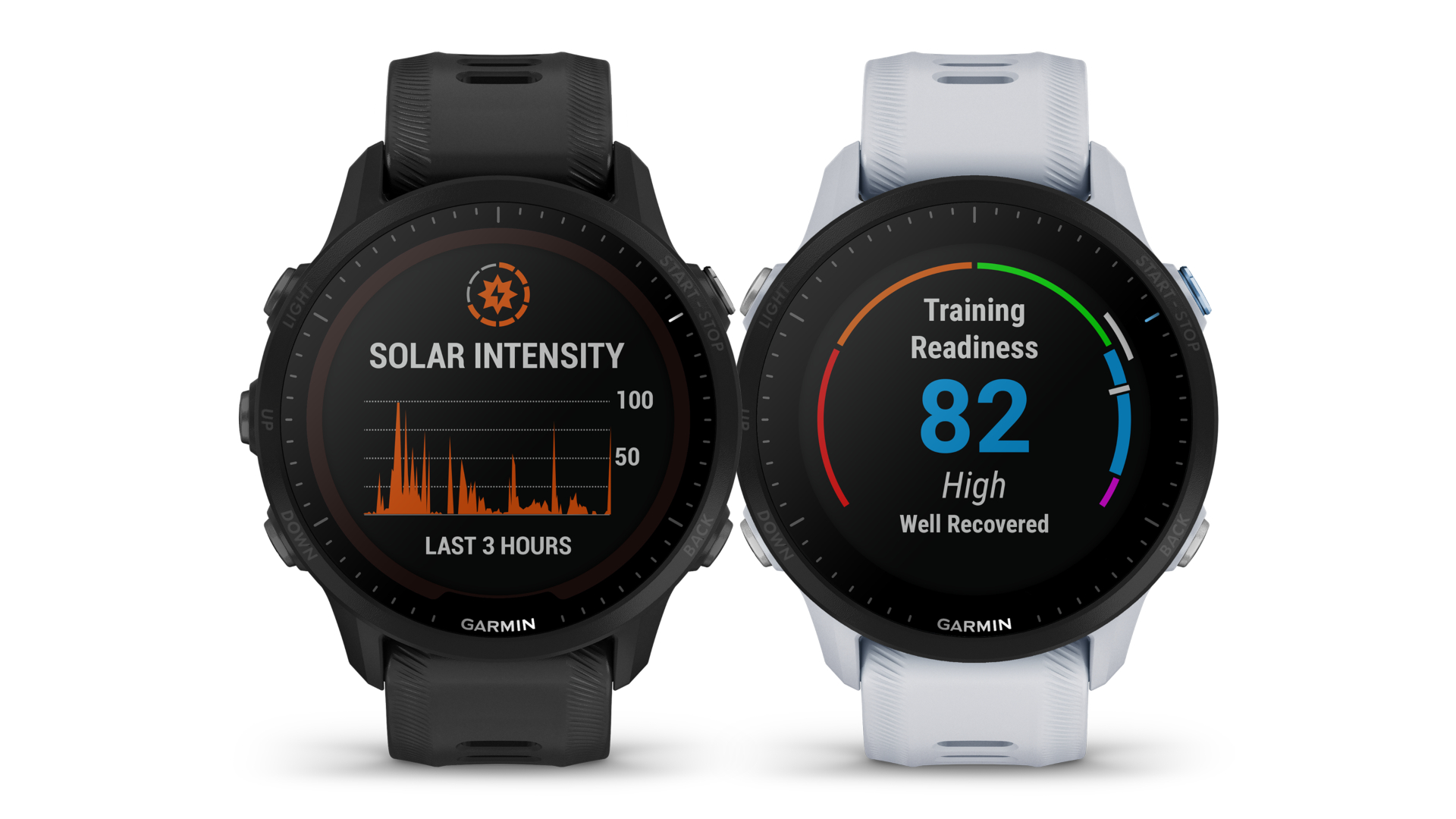
Garmin has added two new models to its popular collection of Forerunner smartwatches: the Forerunner 955 Solar and the Forerunner 255 Series.
Described by Garmin as the “ultimate training smartwatch”, the Forerunner 955 is its first dedicated running watch with solar charging (the Garmin Fenix 6 and Fenix 7 multisport watches already feature it).
Meanwhile the Forerunner 255 is a slimline model that’s offered in two sizes with new features that Garmin says build on the popularity of the previous 245 watch.
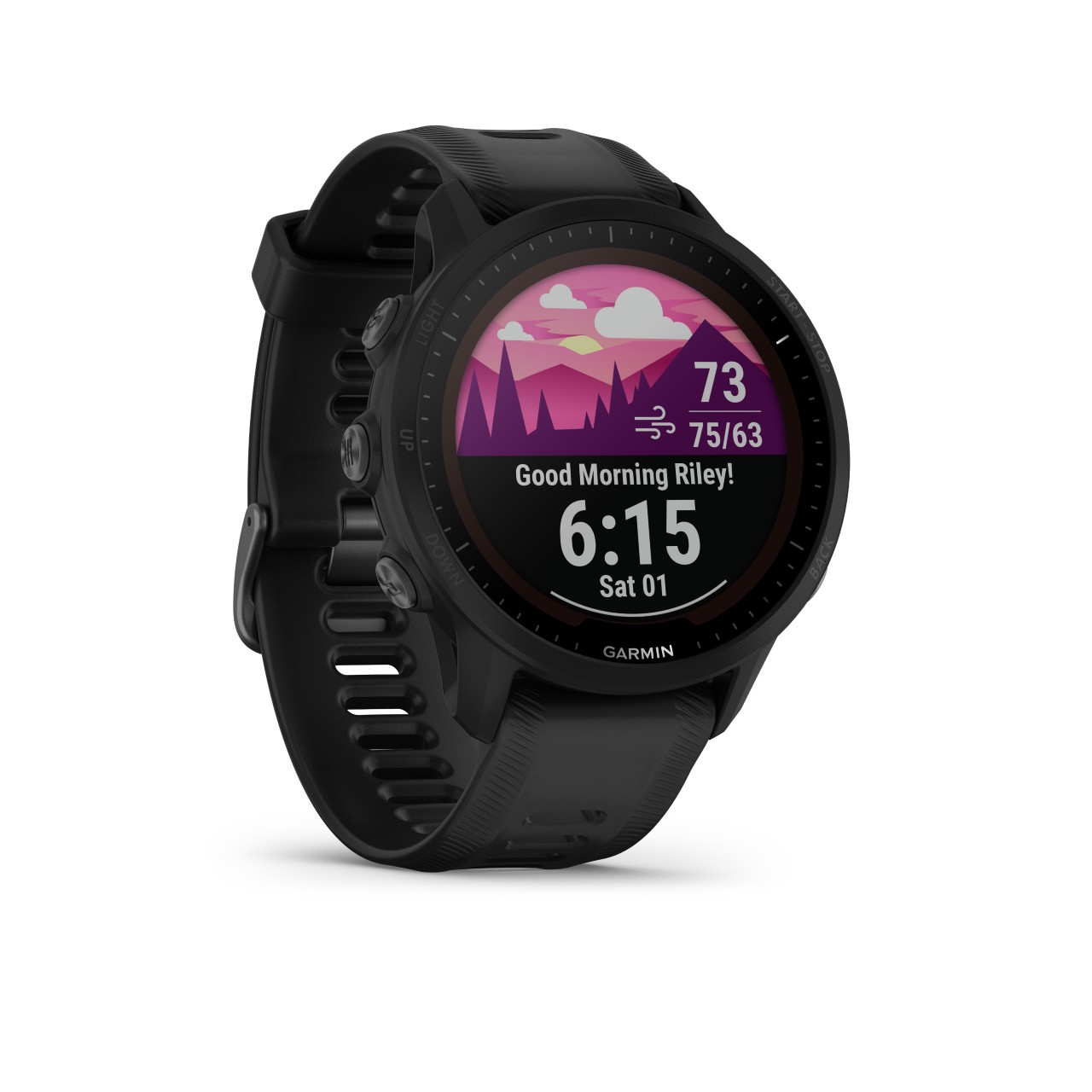
Garmin Forerunner 955 Solar
The Forerunner 955 Solar uses a Power Glass charging lens which, according to Garmin, delivers up to 20 days of battery life in smartwatch mode or up to 49 hours when using the GPS function.
We reviewed the outgoing Garmin Forerunner 945 earlier this year - and gave it 5/5 - and found that for a non-solar watch the battery life was very good, averaging 6-7 days between charges with at least one session of cycling or running each day.
Another feature that the new model adds is a touchscreen. Garmin believes that the traditional five buttons combined with a touchscreen offers the best of both worlds, allowing you to quickly swipe through maps and statistics.
As for maps, they’re delivered in full colour, with turn-by-turn directions as well as additional information such as distance and elevation data.
Routes can be planned and downloaded using a Garmin Connect course creator as well as third-party platforms such as Strava and Komoot. You can also enter a desired running or riding distance and the 955 Solar will suggest routes that will take you back to your starting point.
“Athletes who strive to be the best seek the best training tools,” says Dan Bartel, Garmin’s VP of global consumer sales, and in response it has equipped the 955 Solar with performance and training tools from Firstbeat Analytics. These include VO2 max, training load, performance condition and more.
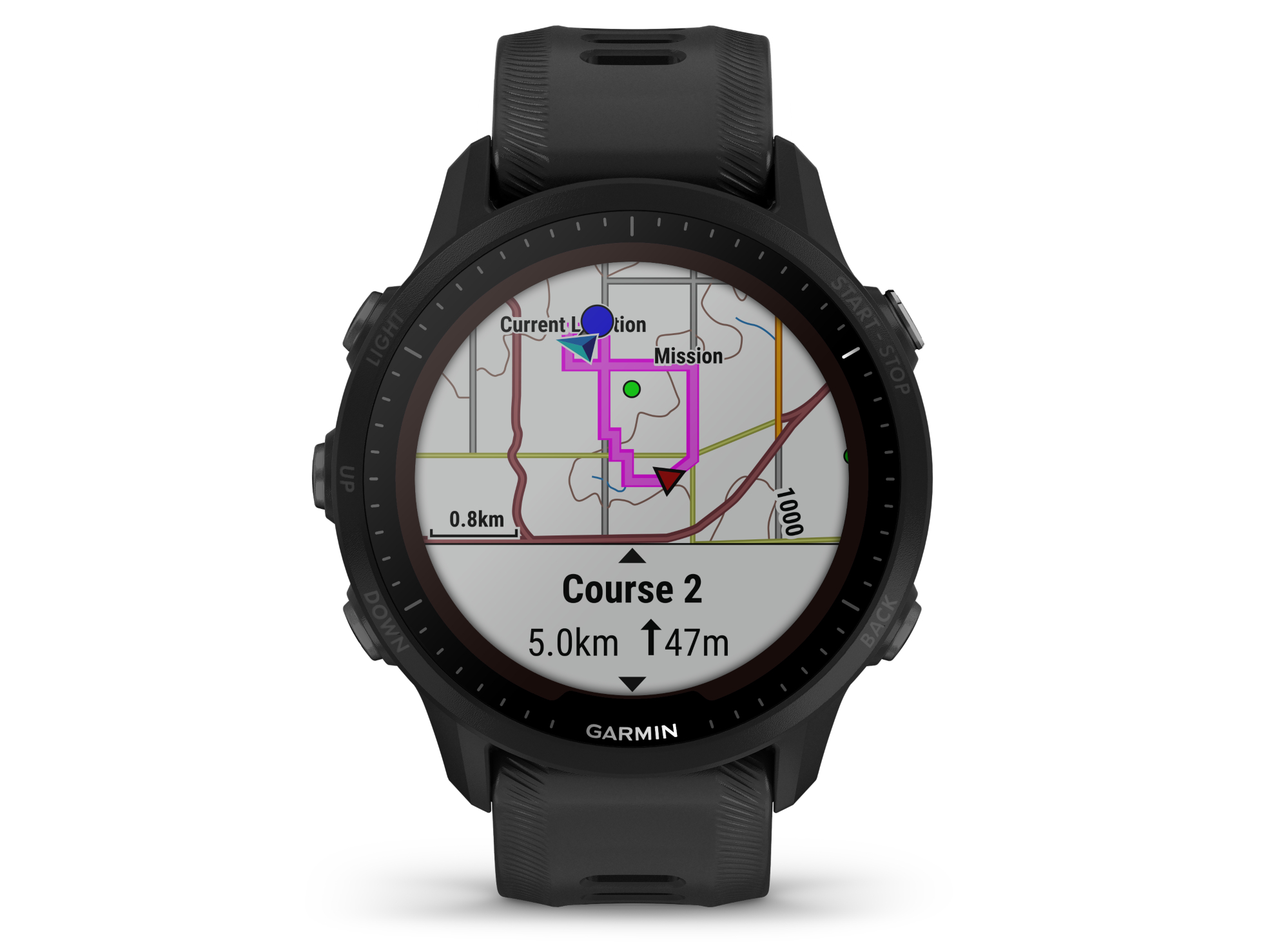
Designed to be worn all day, the 955 Solar uses the wrist-based Pulse Ox to monitor your blood oxygen levels, while Body Battery energy monitoring shows your current energy levels.
This data is used across new features such as HRV status, which tracks your heart rate variability while sleeping, allowing you, according to Garmin, “to get a better handle on recovery” as well providing “an overall wellness picture.”
The 955 also provides women’s health features, including menstrual cycle tracking and pregnancy tracking.
Other new features include training readiness, which tells you how ready your body is for training via a score derived from metrics such as sleep, recovery time and your HRV status. Meanwhile, paring the 955 Solar with a smartphone will mean you can receive a morning report that includes weather information and workout suggestions. Similarly a race widget delivers ‘race prep’ information, including a countdown clock, workouts adapted to your race plans and a race-day specific performance prediction.
Importantly for cyclists, the 955 Solar provides multi-sport capacity, allowing you to track your two-wheeled numbers, including seated/standing position, power phase and platform centre offset. However, you’ll need to have a Garmin power meter to make use of this.
With this being a smartwatch, there’s also built-in music, contactless payments via Garmin Pay and notifications for call, texts and social media alerts. The 955 also includes safety and tracking features, including automatically sending a message to a chosen contact if an accident is detected, though you’ll need to pair it with a compatible smartphone.
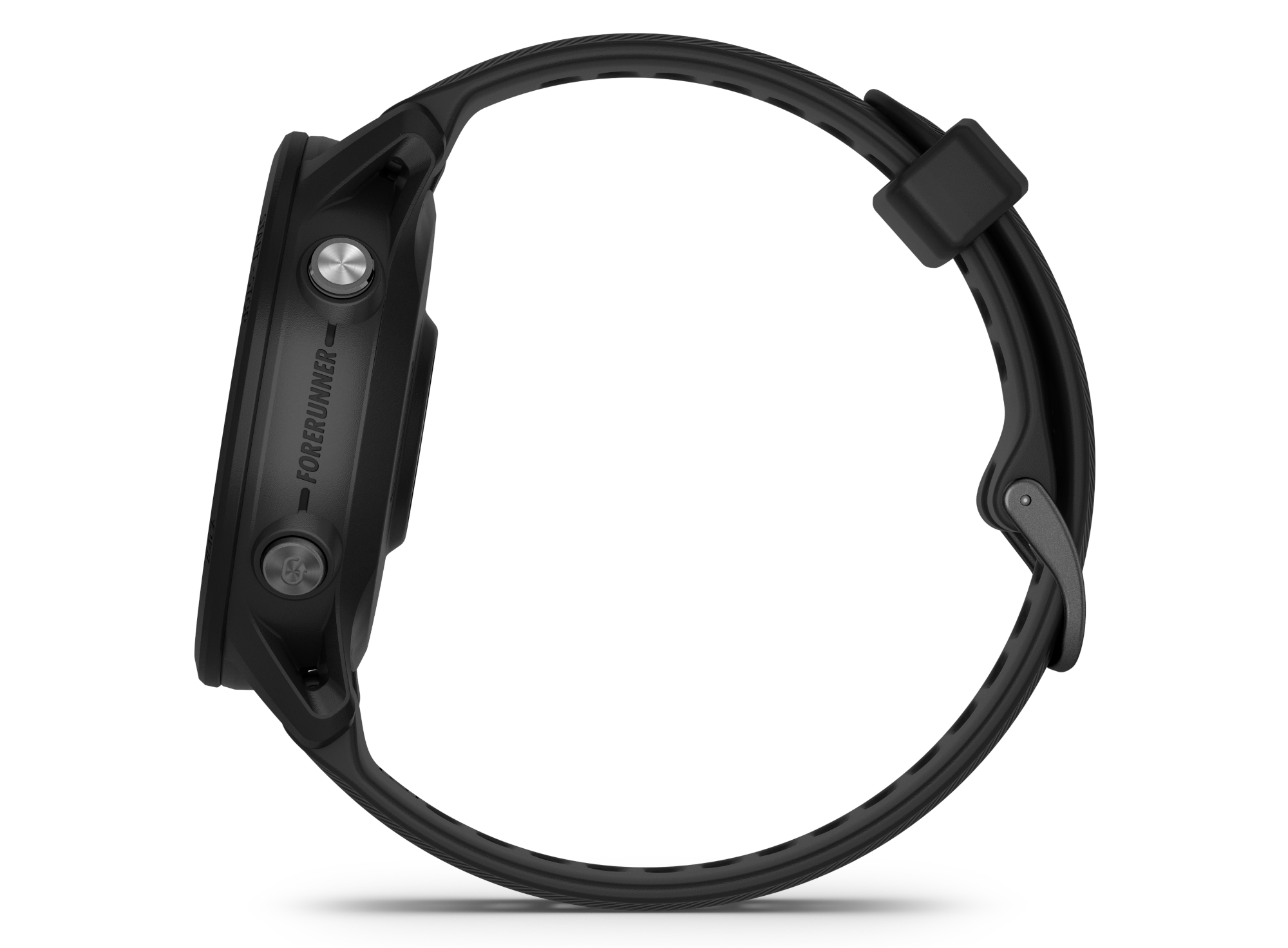
Garmin Forerunner 255 series
The Forerunner 255 is offered in two models, the 255 and the 255 Music, and across two sizes, either a 41mm or a 46mm case size, with the former designated by a ‘S’. The Music model has the capacity to store up to 500 songs, including Spotify, Amazon Music and Deezer playlists from your phone, and can be connected to wireless headphones. Other ‘connectivity’ features include, like the 955, incident detection and live tracking for improved safety as well as automatically uploading your activities to Garmin Connect.
Garmin states the new 255 delivers up to 14 days of battery life in smartwatch mode and up to 30 hours in GPS mode.
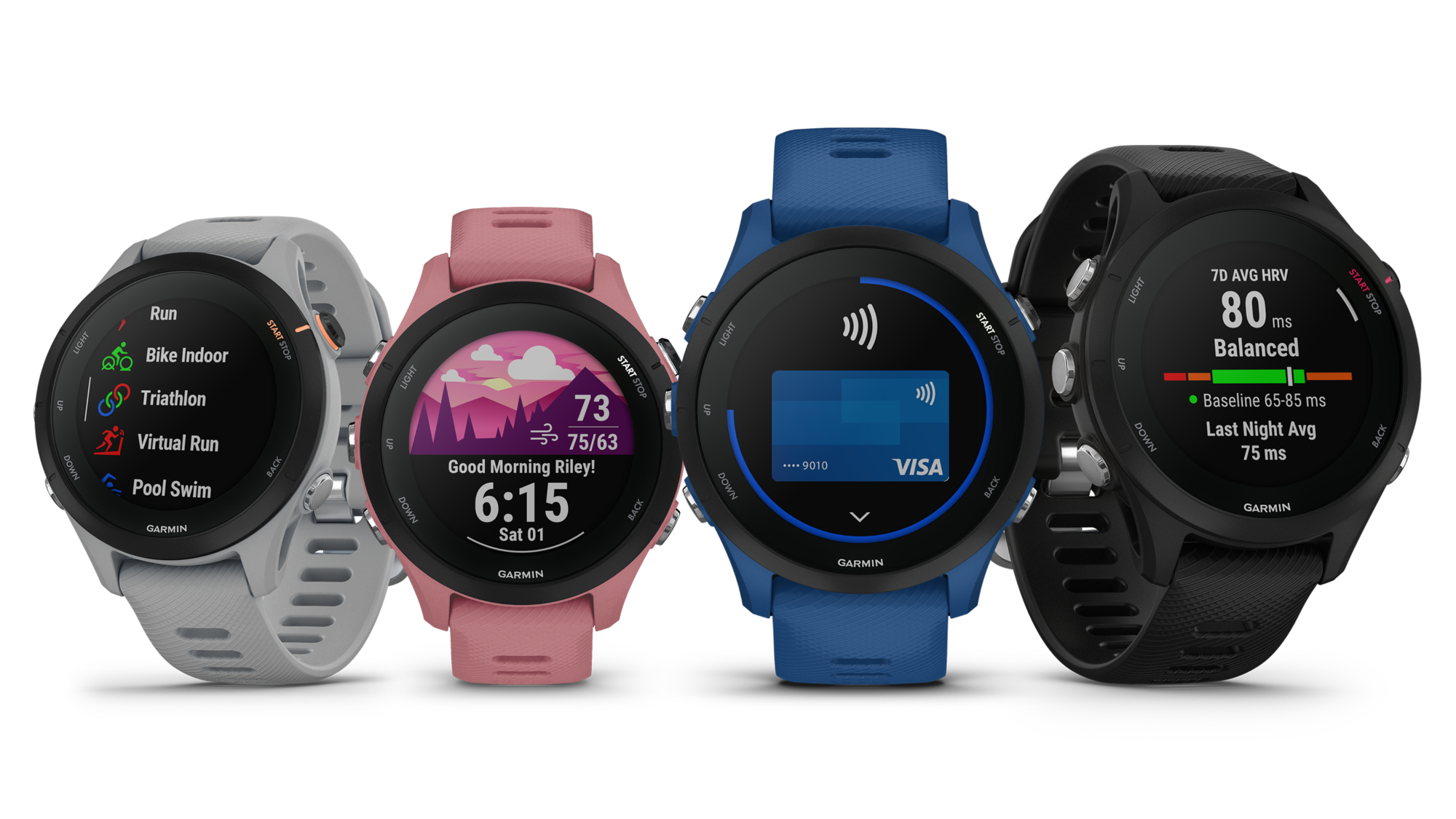
As a smartwatch, the 255 uses the same Pulse Ox and Body Battery functions as the 955 to monitor and produce data indicators like the previously mentioned HRV status and a morning report. It also benefits from similar training tools, such as the race widget, daily workout suggestions and performance metrics from Garmin Firstbeat Analytics.
As you’d hope, given that Garmin has hailed its credentials as a dedicated triathlon watch, the 255 enables you to switch up your workout routine with triathlon and multisport activity profiles at the press of a button.
In GPS mode, the 255, like the 955, can plan and download routes from Garmin Connect as well as creating courses on other platforms such as Strava. And as with the 955, it uses multi-band, multi-satellite-system tracking on the watch for claimed greater accuracy.
The Forerunner 955 Solar has an RRP of $599.99/£549.99. There’s also a non-solar charging version that costs $499.99/£479.99
The Forerunner 255 and 255S are available in a range of colours and cost $349.99/£299.99. The 255 Music and 255S Music come in black and whitestone and have an RRP of $399.99/£349.99.
For more details and to shop the watches check them out at Garmin's website.
And don't miss our guide to the best smartwatches for cycling.

Thank you for reading 20 articles this month* Join now for unlimited access
Enjoy your first month for just £1 / $1 / €1
*Read 5 free articles per month without a subscription

Join now for unlimited access
Try first month for just £1 / $1 / €1
Get The Leadout Newsletter
The latest race content, interviews, features, reviews and expert buying guides, direct to your inbox!
Luke Friend has worked as a writer, editor and copywriter for twenty five years. Across books, magazines and websites, he's covered a broad range of topics for a range of clients including Major League Baseball, the National Trust and the NHS. He has an MA in Professional Writing from Falmouth University and is a qualified bicycle mechanic. He has been a cycling enthusiast from an early age, partly due to watching the Tour de France on TV. He's a keen follower of bike racing to this day as well as a regular road and gravel rider.
-
 'I've bought four kilos of Haribo just in case' - Meet Dr Sarah Ruggins, who has gone from paralysis to aiming for the LEJOGLE record
'I've bought four kilos of Haribo just in case' - Meet Dr Sarah Ruggins, who has gone from paralysis to aiming for the LEJOGLE recordCanadian is aiming to take the overall record for Lands End to John O' Groats to Lands End, which currently stands at five days, 18 hours
By Adam Becket
-
 The sun's out and so am I: why there's no shame in being a fair-weather bike rider
The sun's out and so am I: why there's no shame in being a fair-weather bike riderLet's be honest, rain and riding bikes don't mix well – there's nothing wrong with waiting for the sun
By James Shrubsall